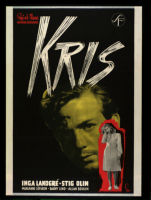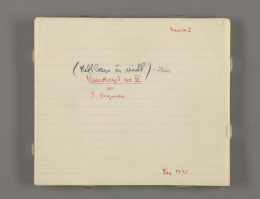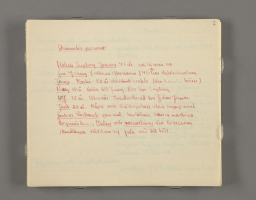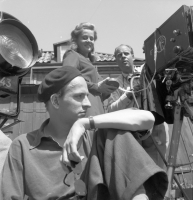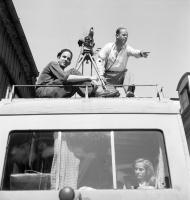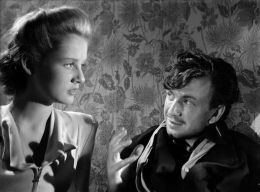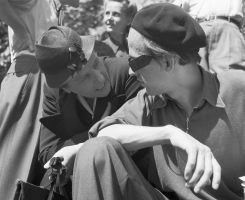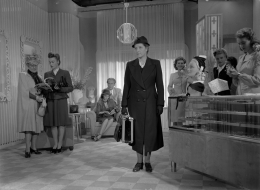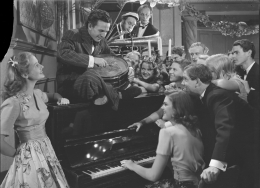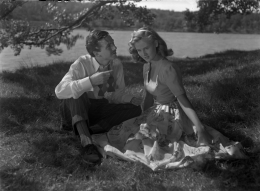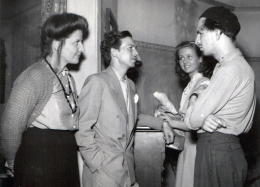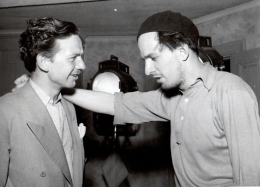Crisis
Bergman's film debut as a director. The foster daughter of a small town piano teacher is courted by her biological mother's decadent lover.
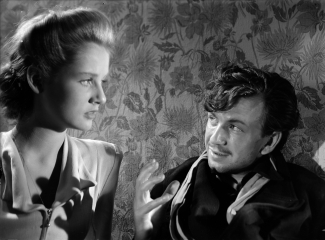
"A few days after the premier of Crisis, the telephone rang. It was Lorens, saying: 'Dear Ingmar. That was an awful film, hard to imagining anything worse! I suppose your phone is ringing off the hook with offers.'"Ingmar Bergman
About the film
Leck Fischer (1904-1956) was a Danish writer who not only wrote a number of plays that were highly successful both in Sweden and his native country, but was also a prolific screenwriter of Danish films between 1941 and 1950. His stage play The Maternal Heart was premièred in 1944, subsequently purchased by Svensk Filmindustri and renamed The Maternal Instinct.
Another director was initially earmarked for the film, but in early June 1945 Ingmar Bergman was asked to develop a screenplay with which he could make his debut as a director. Bergman in Images: My Life in Film:
Even before the filming of Torment, I had bombarded Carl Anders Dymling with pleas asking to be allowed to make my own film but had been turned down. Then one day they sent me a Danish play. Its title was Moderdyret (The Maternal Instinct), its author Leck Fisher. Dymling promised me that I would be allowed to direct the film if I could manage to write a good script from this grandiose drivel. Wildly happy, I spent my nights writing the scenario, at breakneck speed. After presenting it, I was forced to do two or three rewrites before it was decided that I could make the film during the summer of 1945. Inspired by the succes of Torment, I christened it Crisis. It turned out to be an apt title.
Shooting the film
Shooting began in early July 1945 and was complete by the end of August. The many exterior scenes were to be shot in Hedemora, a rural town in central Sweden.
Bergman in Images: My Life in Film:
The first day of shooting any film is always especially tense. That is how it has been for me, up to and including Fanny and Alexander. But this first shooting day was the first one in my cinematic life. I had made meticulous preparations. Every scene was carefully thought out, every camera angle prepared. In theory I knew exactly what I wanted to do. In reality, everything went straight to hell.
There is a classic Spanish play about a couple of lovers who are kept apart by every means possible. When finally they are allowed to spend their first nigth toguether as lovers, they enter the bedroom through separate doors and drop dead. That is exactly what happened to me. The day was hotter than hell, and we were working in a studio with a glass roof. Gösta Rosling, the cinematographer, was not used to the complicated lighting and heavy cameras of the time. He had earned his considerable professional reputation by working with a light camera for the exteriors and in royal solitude. His assistant was inexperienced, and the sound technician a walking catastrophe. The female lead, Dagny Lind, had hardly ever appeared infront of a movie camera before, and she was paralyzed with fright.
Generally speaking, back then one was supposed to do eight camera angle shots per day, which correspondeded to one every hour. This first day we managed to do two. Later, when we viewed that day's rushes, everything was out of focus. What's more, the microphone was visible at the edge of the picture. Dagny Lind spoke as one does on stage. The scenes were the kind you see in the theatre. In short, a veritable catastrophe [...]. At an early stage, when the studio executives wanted to abort the filming, Dymling intervened, having seen three weeks of dailies. He suggested that we start all over again from the beginning. I was deeply grateful to him.
My next guardian angel was Victor Sjöström, who occupied an ill-defined role as artistic adviser to the studio: (from The Magic Lantern)
' [...] As if by chance, Victor Sjöström, began to turn up whereever I was. He grasped me firmly by the nape of my neck and walked me like that back and forth across the asphalted area outside the studio, mostly in silence, but suddenly he would say things that were simple and comprehensible: 'You make your scenes too complicated. Neither you or Rossling can cope with those complications. Film the actor from the front; they like that and it's the best way. Don't keep arguing to everyone. They simply get angry and do a less good job. Don't turn everything into major issues; it'll suffocate the audience. A minor detail should be treated like a minor detail without necessarily having to look like one.' We walk around and around, back and forth across the asphalt, he holding onto the back of my neck and being down-to-earth, factual, and not angry with me, although I was being so unpleasant. [...]'
In addition to the friendly Victor Sjöström, who insisted on treating me as a fellow director, I gained one ally after the long shooting was ended, the film's editor, Oscar Rosander: (In The Magic Lantern): 'When I went to his house after the shooting was completed, and I was disappointed, bleeding, and furious, he treated me with abrupt and friendly objectivity. Mercilessly he pointed out what was bad, terrible, or unacceptable in my film. But he praised me for what he liked. He also initiated me into the secrets of editing – among other things, a basic truth: that editing occurs during the filming itself, the rhythm is created in the script. I know that many directors hold the opposite view. For me Oscar Rosander's teaching has been fundamental.'
Sources
- The Ingmar Bergman Archives.
- Ingmar Bergman, Images: My Life in Film.
- Ingmar Bergman, The Magic Lantern.
U Sm in Svenska Dagbladet:
Ingmar Bergman's Crisis is a boldly realistic, intelligently probing, intense and exciting story about entirely everyday things. [...] The simple drama is presented at a gruelling pace and with a surfeit of atmospheric details. The film contains scenes which must quite simply be regarded as being at the summit of anything seen by way of film. This is especially true perhaps of the opening scenes, particularly Jack's arrival in the rural town, his meeting with Jenny in the hotel room and his exaltation during and after the small town ball. [...] In its way, the director's choice of actors is just as admirable as their performances. [...] Gösta Roosling's distinctive and courageous photography and Erland von Koch's discrete and suggestive score are also worthy of praise. Crisis is, in other words, an experience. One is grateful that such a film is made. And that it is made in Sweden.
Georg Svensson in Bonniers Litterära Magasin:
This writer must, for his own part, declare that seldom has he seen anything more abortive, spurious and tedious. Naturally, Crisis has been designated experimental. But wherein lies the experiment? It cannot be in the action, because that is no more experimental than any other 'universal' short story or any other pretentious Swedish film you might care to name. [...] No, by God, the action is not experimental, as Ingmar Bergman too has obviously realised, since he has so palpably striven to make the characters more interesting than becomes them. [...] There is something unbridled, nervously uncontrolled in Bergman's imagination that leaves a disturbing impression. He is thrown from one exaggeration to the other and is seemingly incapable of maintaining a rational position. [...] What Swedish cinema needs is not experimenters, but intelligent, sensible people who can present us with living people and meaningful arguments.
Bang in Dagens Nyheter:
In this it seems to me that Ingmar Bergman is the answer to the prayer, not to say the increasingly impatient plea, offered up in respect of Swedish film. It needs personalities to make their mark on a work, people have said: we have to get away from this formulaic filmmaking in which too many cooks have their eye on the audience. [...] Crisis is without doubt the longest, boldest and most decisive step away from parochialism that Swedish film has taken for a very long time.
Filmson in Aftonbladet:
Almost is the word for Crisis, it is almost anything one might care to name, but only almost, almost a success yet almost a fiasco. There is so much that is good, excellent even in the film, properly thought out and skilfully executed, yet that only makes one doubly irritated by what is immature and unsuccessful, ensuring that one leaves the film with a feeling of dissatisfaction. [...] Throughout, however, there are fascinating images laden with meaning that are brilliant in themselves. One fine day Ingmar Bergman will learn the art of melding these together to form a logical entity.
Distribution titles
Crise (France)
Crisi (Italy)
Crisis (Great Britain)
Crisis (Spain)
Kriisi (Finland)
Krise (Norway)
Krise (West Germany)
Mitt barn er mitt (Norway)
Moderhjertet (Denmark)
Production details
Production country: Sweden
Distributor in Sweden (35 mm): Svensk Filmindustri
Laboratory: Svensk Filmindustris filmlaboratorium
Production company: Svensk Filmindustri
Make up: Firma Carl M. Lundh AB
Original work: Moderhjertet (Play) by Leck Fischer
Aspect ratio: 1,37:1
Colour system: Black and white
Sound system: AGA-Baltic
Original length (minutes): 93
Censorship: 069.774
Date: 1963
Age limit: 15 years and over
Length: 2540 metres
Censorship: 069.774
Date: 1946-02-12
Age limit: 15 years and over
Length: 2555 metres
Release date: 1946-02-25 Palladium, Helsingborg, Sweden, 93 minuter
Spegeln, Stockholm, Sweden
Filming locations
Sweden (1945-07-04-1945-08-31)
Filmstaden, Råsunda (studio)
Hedemora (among others - exteriors)
Music
Title: An der schönen blauen Donau, op. 314
Composer: Johann Strauss, the Younger. (1867)
Comment: Instrumental.
Title: Frühlingsstimmen, op. 410
Composer: Johann Strauss, the Younger. (1882)
Comment: Instrumental.
Title: Rosen aus dem Süden, waltz, op. 388
Composer: Johann Strauss, the Younger. (1880)
Comment: Instrumental.
Title: Il bacio Alternative title: Kyssen
Composer: Luigi Arditi (1860)
Lyrics: Gottardo Aldighieri (Italian lyrics 1860)
Singer: Dagmar Olsson
Title: Jitterbug
Composer: Charlie Norman
Comment: Instrumental.
Voiceover: Let the play begin. I wouldn't call this a great or harrowing drama. It is merely an everyday play. Almost a comedy. Let's raise the curtain.
Jenny: I wasn't much older than you are now when I had you
Nelly: I know you've been through a lot for my sake.
Jenny: We all have our crosses to bear.
Doctor: Now you know how matters stand.
Ingeborg: I'm very grateful. Tell me something else. What will I be like, can I be up?
Doctor: Absolutely. You'll be moving freely up until a couple of months before.
Ingeborg: And the fits?
Doctor: You get medicine for that.
Ingeborg: Things are really as they should be. It serves me right.
Jenny: Here's her diary.
Ingeborg: Do you read her diary?
Jenny: Oh, I just leaf through it. It's so amusing. Listen to this, for example. "I was with mother when she dressed this morning, she looks so young. Her skin looks younger than mine, which is greyish." Isn't that cute?
Ingeborg: I don't want to hear any more.
Jenny: No? I won't go on reading, then.
Ingeborg: I often saw her write in her diary, but I have never read it.
Jenny: That's you, Miss Johnson. But then you are so righteous.
Jack: I can't fall in love. I only love myself. But Nelly, she is somehow real, if you know what I mean.
Ingeborg: I know.
Jack: She is so real that I become even more unreal and start wondering why I live my ghost life at all.
Ingeborg: Maybe I understand.
Jack: I could do with her as my anchor in reality. For my own benefit, that is. It's a purely egoistical point of view.
Ingeborg: There's a price to pay for that.
Jack: Oh, yes. If you only take without giving, the penalty is extremely severe.
Ingeborg: Could I have a cigarette? Your words are a little upsetting.
Jack: You've given and given, without a thought of yourself.
Ingeborg: Have I?
Jack: Nelly always talks of you. She loves you. She'll come back to you one day, then you'll have your reward. Jenny and I will have to pay then. Jenny
lives off me. And I live off Nelly. It's all rather infernal.
Nelly: Poor Jack.
Jack: I've said that to myself too often. It can't go on. I can't bear another day of grinning. I'll kill myself! But that's just acting. Although I'm always carrying a revolver in my pocket.
Nelly: Poor Jack.
Jack: Sure
sure. You get what you want in life. And you get to pay the price. That doesn't stop your pity being sweet music to my ears.
Nelly: I wish I could help you.
Jack: Don't listen to her.
Jenny: Has he told you about murdering a girl he lived with? She had two children. He gassed them all and made it look like an accident. Has he asked you to go with him to the police? To help him report his crime. Did he show you his gun, saying he must end his moonlight life?
Jack: Jenny, that's enough.
Jenny: Perhaps he said you were his anchor in reality. He can't go on grinning. He has to either die or go to the police. Did he say that? How many people has he said that to?
Mark Sandberg, 1996:
The seductions and disillusionments of city life play counterpoint to provincial goodness in this morality tale of a young daughter pulled between the worlds of her two mothers. The script itself is unremarkable; Bergman later disclaimed responsibility for the story by saying, "If someone had asked me to film the telephone catalogue I would have done so." One can imagine that Bergman's version of the phone book at this point in his career might have been the same fascinating jumble of cinematic styles that one can find in Crisis, where the French cinema of the thirties meets expressionistic lighting, an early attempt at a Bergmanian dream sequence, and introspective mirror shots. Most interesting is perhaps the arrogant and debonair seducer, Jack. Reportedly added surreptitiously to the script by Bergman just before shooting began, Jack is a foreign irritant in this otherwise banal narrative, as well as a harbinger of tortured characters to come in Bergman's other early films.
Collaborators
- Inga Landgré
- Stig Olin
- Marianne Löfgren
- Dagny Lind
- Allan Bohlin
- Ernst Eklund
- Signe Wirff
- Svea Holst
- Arne Lindblad
- Julia Cæsar
- Siv Thulin
- Anna-Lisa Baude
- Karl Erik Flens
- Sture Ericson
- Margit Andelius
- Carin Cederström
- Mona Geijer-Falkner
- Dagmar Olsson
- Wiktor "Kulörten" Andersson
- Gus Dahlström
- John Melin
- Holger Höglund
- Ulf Johanson
- Hariette Garellick
- Monica Schildt
- Singoalla Lundbäck
- K. Koykull
- John W. Björling
- Per Hugo Jacobsson
- Nils Hultgren
- Erik Liebel
- Hjördis Gille
- Rune Ottoson
- Brita Billsten
- Gudrun Stäck
- Maud Hyttenberg
- Ullastina Rettig
- Gustaf Hedström
- Hortensia Hedström
- Otto Adelby
- Hanna Adelby
- Oscar Heurlin
- Gösta Qvist
- Manetta Ryberg
- Erik Forslund
- Arne Åkermark, Art Director
- Jarl Nylander, First Assistant Cameraman
- Birger Nilsson, Boom Operator
- Gösta Roosling, Director of Photography
- Alva Lundin, Titles
- Lars-Eric Kjellgren, Unit Manager
- Harry Malmstedt, Unit Manager
- Ragnar Carlberg, Unit Manager
- Oscar Rosander, Film Editor
- Lennart Svensson, Production Mixer
- Erland von Koch, Music Composer
- Victor Sjöström, Production Manager / Production Coordinator
- Harald Molander, Production Manager / Production Coordinator
- Seivie Ewerstein, Script Supervisor
- Louis Huch, Still Photographer
- Ingmar Bergman, Screenplay
